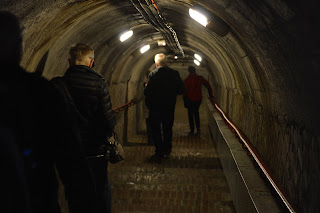The Ulster Tower was built as a replica of a tower in Ireland as a
tribute to the 36th Ulster Division for their part of the 1 July
1916 attack on the Somme where the British lost 60,000 casualties.
Frequently there are small piles of unexploded ordnance by the side of the road awaiting collection. They have to be taken away and not destroyed in-situ as they may be gas shells.
The Beamont-Hamel Newfoundland Memorial Park is a testament to the
country of Newfoundland (later it joined Canada), they lost 500 out of 800 men
in a single morning. It was a very attractive memorial, which has some of the
original trenches still in place.
The Thiepval memorial and museum for the missing British and South Africans,
the 72, 000 names are a sobering thought.
For lunch we stopped at the Blighty Café which provided us with excellent
food of homemade vegetable soup and savoyard (toasted bread with bacon and
cheese).
Lochnagar Crater which was a mine detonated on 1 July 1916 as part of
the opening of the Somme Offensive. One
of the poor British fellows was discovered about 10 years ago and re interred at
a nearby cemetery on the anniversary of the battle. It was one of 19 mines
detonated and is 30 metres deep and 100 metres across.
We drove past the 1st Divisional Memorial in which
Elizabeth’s great uncle served in as part of the 9th Battalion and
stopped at the Pozieres British Cemetery which is mainly, but not exclusively
Australian.
The remains of Pozieres windmill and is “is more densely sown with
Australian sacrifice than any other place in the world,” and tank memorial.
This was a terrible 1916 battle that crippled the Australian divisions as they
were shelled from three sides. It is arguable the heaviest bombardment that
they ever had to endure.
There is also a new memorial to animals killed in war.
We finished the day with a visit to the Somme 1916 Museum in the small
town of Albert which has created using the underground tunnels used by the
French during WW1. It was an excellent use of space and very well done.
We had dinner at one of the many restaurants on the squares with some
of our tour buddies. I asked for a large
beer but didn’t realise exactly how large a large beer was. Amongst the many
French cuisine items we were intrigued to find a Corn Dog which in the French
translates as Corn Dog.











Wonderful photos. Looks like you’re enjoying great weather! And that is a good size beer!
ReplyDelete